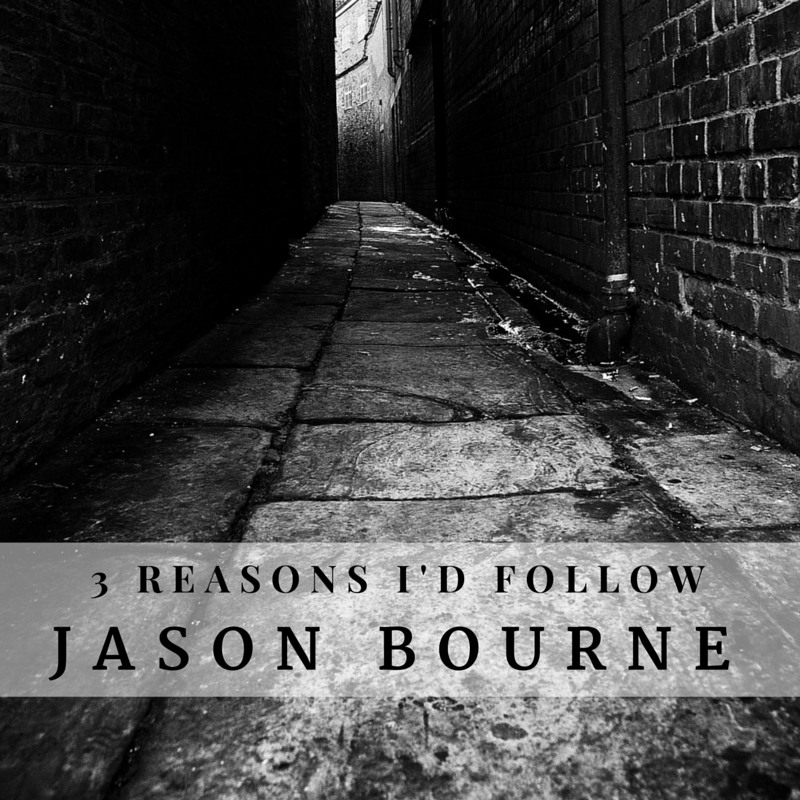Running through the alley, the sounds of footsteps echo behind me. Breathless, I am quickly being pushed to my physical limits, but I am not frightened. I know he’s looking out for me.
A day at the office is not nearly as suspenseful (we hope) as in books or movies. That said, it can feel like deadlines are looming, the amount of work we are expected to do is overwhelming, and that our mental endurance might fail us along the way. Strong and supportive leaders help us get through the “dark times” – the doubt we might have regarding our ability to succeed or complete an assignment. We want to deliver for them – will push ourselves – knowing that if we stumble or fall, they will be there to help us get back up again.
Great leaders abound in writing and in film. One that stands out in both is Jason Bourne*. Yes, he’s an assassin for the US government. By definition, he should be a loner – detached and impersonal. Yet he rails against that definition and demonstrates strength of character and interpersonal connection that defy the word “assassin.” Looking past his day job – a minor detail – he has leadership skills that would inspire many to follow him.
No mistake is too big to recover and learn from
When we first meet Jason Bourne, he is an amnesiac. We don’t know any more about him than he knows about himself. Little by little, we learn about his fighting and weaponry skills, but they are offset by his kindness to Marie. He appears approachable, and only dangerous to the wrong people.
Over time, we discover that Jason was an assassin. He killed people. If there was ever a huge mistake in judgment, that’s probably it. Ultimately, he did it for good reasons. Jason thought he was protecting our country. Instead, he was a very skilled weapon being yielded for political or other nefarious purposes by those he pledged to serve.
Jason had a myriad of choices when he discovered his past. In his amnesia, he believed himself to be a better person, so he could have been immobilized by the truth. Alternatively, he could have embraced the knowledge and returned to his former life. Instead, he refused to be defined by what he had done in the past. He decided to understand how he became an assassin and then extricate himself so he could move past it and be the person he wanted to be.
Good leaders don’t believe in the old adage “1000 atta-boys get wiped out with one ‘oh shit.'” Employees feel comfortable taking risks and are willing to make mistakes when they know they are not be defined by those mistakes.
Protect what’s yours
Nikki Parsons gave Jason “assignments” when he was an assassin. As he was rediscovering his past, Jason encountered Nikki and associated her with the organization he was trying to extricate himself from. From his perspective, she was the enemy.
Later, as Jason learns more about his past, he meets Nikki again. This time, it is in both of their interests to work together to discover the truth. As partners, Jason considers Nikki to be his responsibility and he protects and defends what’s his.
For employees, it’s important to know that a leader will stand in the face of “stuff” rolling down hill, and not just move aside so it takes out everyone in its path. By providing them with cover, leaders allow employees to focus on the work instead of constantly looking over their shoulders to see what might be coming at them.
Be accountable
During Jason’s discovery of his history as an assassin, he realized that he killed a good man and his wife. The official story released by the press was that it was a murder-suicide. Jason discovered that the couple had a young daughter and went to visit her. He told her the truth – that he killed her parents and that they did not kill each other and abandon her, as she had been led to believe.
He took accountability for his actions. He could have excused his behavior – he thought he was doing something noble, he was following orders, or some other justification. Instead, he stood up to what he had done and gave her the truth, as well as some of the love she had lost for her parents when she thought they abandoned her.
The truth can hurt, but lies erode trust. Strong leaders are transparent and trustworthy. Employees would rather work for someone who shares the painful truth than one that paints a pretty lie.
While he definitely needs to consider a career change, Jason Bourne has the raw ingredients to be a great and inspiring leader. He is compelling and prone to action, certainly, but he also cares about people and holds himself to a high standard. These are traditional leadership skills that would serve him well, but it is his refusal to be defined by those around him that have shaped him into a non-traditional, but effective, leader I’d be willing to follow.
*Note: From this point forward, all references to Jason Bourne’s character are from the film series.










2 Responses
I discovered your homepage by coincidence.
Very interesting posts and well written.
I will put your site on my blogroll.
🙂
Glad you found me, even if it was an accident! I’m glad you find value in the site and I look forward to hearing from you again.
Thanks!
Kristin